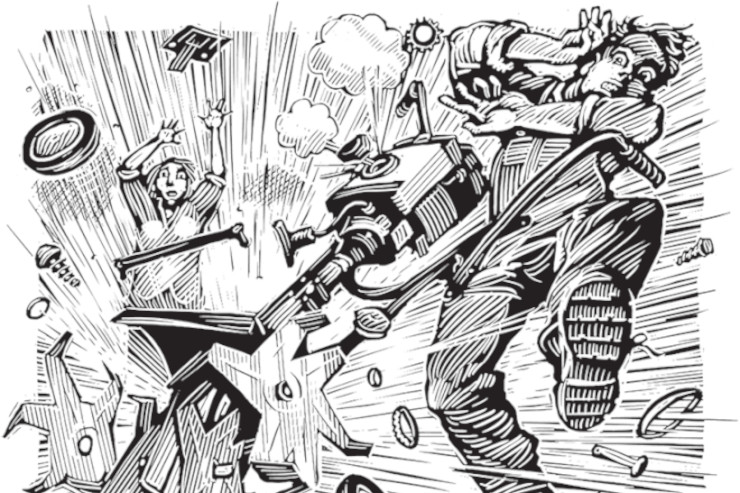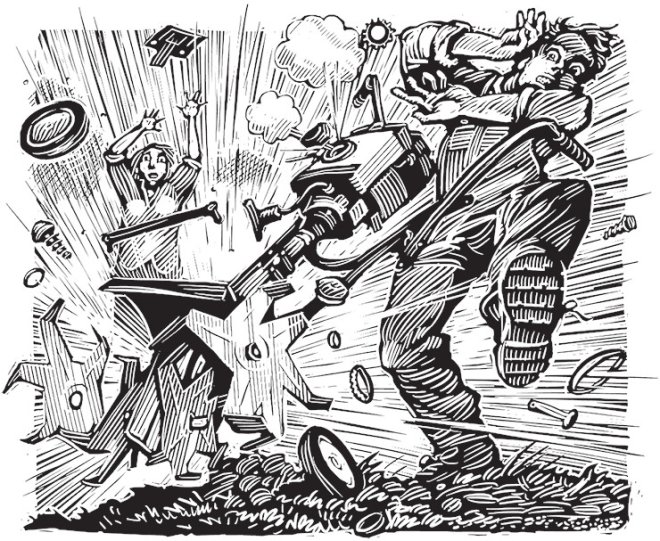
At times when I’m in the garden, I feel like I could be the star of any story about vegetable gardening for dummies. Most of the time I know what I’m doing, but every now and then the stars align (or would that be misalign?) and I feel like I’m pulling zucchini seedlings instead of weeds or planting my tomatoes too close together or forgetting to bring my tools in before a rainstorm.
I’m also happy to say that I know when I’m in over my head. I’m not about to take on electrical work to put outlets in a greenhouse or get into the plumbing for an irrigation system. After all, it’s vegetable gardening for dummies we’re talking about here; not vegetable gardening for people who don’t know their limits!
Sometimes, though, the dummies part happens even before the garden gets tilled. In fact, it’s the tiller itself that’s the impenetrable barrier to a new garden. That’s the case in Rebecca Monhollon’s story, Our First Tiller. Despite growing up in gardening families, neither Rebecca nor her husband knew much about planting their own garden. What they did know was that, to start a garden, they needed a tiller.
This seems easy enough, but hilarious escapades ensue once Rebecca and her husband get the tiller home. I got a good laugh out of this story, and hope you do, too.
Read All Sorts of Stories About Plant and Vegetable Gardening for Dummies, Smart Folks, and Everyone In Between
This story comes from our archive that spans over 30 years and includes more than 130 magazine issues of GreenPrints. I love pieces like these that turn stories into comical moments of laughter, and I hope you enjoy this story as well.

Our First Tiller
And our last.
By Rebecca Monhollon
My husband and I both grew up in the mountains of eastern Kentucky. Now you have to understand that in eastern Kentucky, a garden is an essential part of life. Not particularly because you need a garden to live—raising a garden is just something you do.
Children are taught how to garden from the time they are able to drag a hoe. The traditions of gardening are passed from one generation to the next just like the seeds to plant a garden are handed down through the years.
There are certain times to plant each vegetable. Peas, for example. I remember my grandmother always planted peas in February under a full moon. I have no idea why.
I do remember being forced to hoe corn. I learned really fast that if you are zealous and you wholeheartedly chop some corn down in the process, it is amazing how fast you will be sent out of the garden to do something else.
For some reason, neither my husband nor I retained the knowledge our parents tried so diligently to pass on to us. This didn’t matter much until Eddie and I had married and bought our first farm. I remember going to the grocery store and buying a bag of potatoes. I stood in the checkout line thinking that I was doing something terrible. This had to be the awfulest thing I had ever done. Potatoes didn’t come from the store, they came from the bin in the cellar.
They didn’t put the sack of potatoes in a grocery bag, and that bag of potatoes mocked me from the store to the car. I looked back at them lying on the seat as I drove home and almost ran off the road. I swerved to avoid going in the ditch, and that sack of potatoes rolled off the seat and squashed the loaf of bread. As I thought about this terrible thing of having to buy potatoes, I decided that I just wasn’t going to buy them any more. A plan began to form in my mind. There was plenty of room behind the back of the barn to plant a garden. I mean, how hard can it be? I had watched my grandparents and my parents raise a garden every year since I could remember.

When I arrived home, I informed Eddie of my plan. It took a little convincing to get him on my side. The first thing we decided was that we were going to need a tiller. We dropped everything we were doing and headed to the farm store. Did you know that garden tillers are expensive? After inspecting the various tillers they offered, we figured that a small one would do for our little garden just as well as one of those bigger ones. After all, isn’t the purpose of a garden to save money on groceries?
The two of us proudly come home with the smallest tiller they have, you know the ones with the itty bitty wheels in the back and the big chopper thingies in the front. We open the box expecting to take out that tiller, pour in some gas, and begin our gardening adventure. It’s not put together. Okay, how hard can it be? We lay out the parts in the grass and make sure they are all there. I stand there looking at all the little parts with a sinking feeling and state, “Maybe we should ask Dad to come help us.” Eddie brushes that off. “I don’t need help,” he says in his most offended voice. “Just read the directions.”
Whoever wrote those directions obviously did not take into account the fact that someone would read them. I consider finding a magnifying glass to locate the section written in English. At this point, I feel like giving up, even before we get started. After about an hour, the parts are still lying on the ground, and Eddie and I are arguing. Loudly. I throw down the directions and stomp off into the house. Ten minutes later, I see him standing there trying to read the directions with a confused look on his face. The pangs of guilt take over, and I go back out to help.
We figure out that the little “T” looking thingie goes on the engine, and we attach that with the proper screws. Then we discover that the plow thingies will not fit because we have the “T” thingy attached backwards. Okay, change that and attach the plow thingies. We look at what we have accomplished, and Eddie exclaims, “We’re cooking with fire now!”
After those two steps, the rest comes sort of easy—only a few smashed fingers and a couple more arguments.
Finally, we step back and there it is in all its glory—a shiny new red tiller! All put together and ready to chop up the ground for our first garden. We very carefully read the instructions at this point and put the oil into the right spot and the gas in its right spot. Woo Hoo! We’re ready to till! We push the bulb on the side just the right amount of times and wait the 20 seconds. Eddie takes the pull rope to start the tiller and gives it a big yank. It pulls out quickly and snaps back fast, hitting his hand and causing a bruise. Nothing. Not even a whimper of noise from the engine—but a few choice words from Eddie!
Okay, we’ll try it again. Same result: bruise on hand and no noise from the engine. Eddie is now threatening to go get his shotgun and shoot the flushlinger thing. I watch helplessly as he pulls the rope several more times. On one pull the rope comes halfway out and locks, and Eddie falls flat on the ground. “Maybe it just hasn’t picked up the gas,” I volunteer. The only response is a scowl from Eddie. Ladies, you know the look. The this-was-not-my-idea-in-the-first-place look. I pick up the directions and there it is—the one step we have left out blaring out at me. Now, how to tell Eddie that the tiller has an On and Off switch? I casually say, “Is it in the run position?” Another scowl. OK, enough subtlety. I hold up the directions and show him the picture of the On and Off switch. He reaches down and flips the switch on the side of the engine. This time, the tiller comes roaring to life! I clap my hands with glee. Eddie smiles and gives me the I-told-you-I-could-do-this look. He plants his feet behind the tiller and pulls the lever to make it go.
The tiller takes one big huge bounce, hits a rock—and flies apart! I don’t mean a few parts come off. No, this looks like a bomb exploded inside it. Pieces are lying all over the ground. Eddie is standing there with the motor dangling in the air. It is still running.
Without a word (not even about the flying bolt I dodged), I head to the house, calmly retrieve the car keys, and drive to the farmers market. When I return with a load of vegetables, Eddie is nowhere to be found. The tiller, though, is in the corner of the barn with all the parts piled on top of it.
Today it’s been years since we moved from that farm, but I like to think that tiller (or the pieces of it) is still sitting in the corner of the barn.
It can stay there. ❖
By Rebecca Monhollon, published originally in 2016, in GreenPrints Issue #105. Illustrated by Tim Foley

Have you ever encountered a gardening problem that made you feel not so smart? I’d love to read it in the comments.



